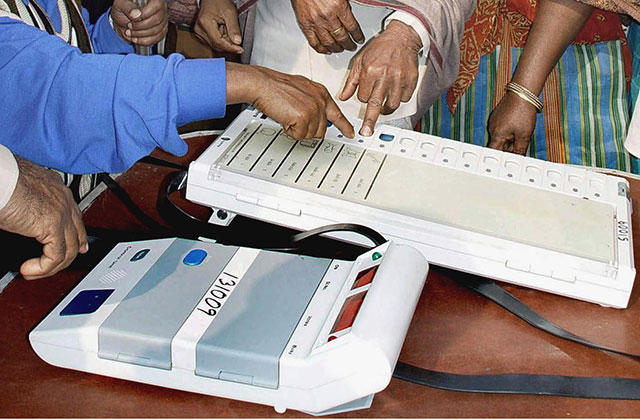Abu Dhabi: A cross-section of Indian expatriates in the UAE has demanded that the Indian government fulfil its promise to the Supreme Court and take steps to ensure that Non-Resident Indians (NRIs) can vote from abroad at the earliest.
 “It is regrettable that there was a delay on the part of the government in initiating the legal procedures [to implement NRI voting rights] as instructed by the Supreme Court,” said Nitin Sharma, 40, a marketing director from Maharashtra.
“It is regrettable that there was a delay on the part of the government in initiating the legal procedures [to implement NRI voting rights] as instructed by the Supreme Court,” said Nitin Sharma, 40, a marketing director from Maharashtra.
“However, I am glad that the steps have already been taken in this direction. The government should table the bill for necessary legal amendments in parliament at the earliest.”
 Some NRIs want the government to table the bill in the ongoing parliament session.
Some NRIs want the government to table the bill in the ongoing parliament session.
“If [there are] any practical difficulties in the present session, the government should present the bill at least in the winter session of parliament later this year,” said Krishna Bhat, 34, an IT professional from Goa. “No further delay at all.”
As Gulf News reported on Saturday, the Indian government told the Supreme Court on Friday that it would amend the existing electoral law to allow 10 million NRIs to vote from abroad in elections back home.
The court gave the government two weeks to inform it how it will amend the law.
As Gulf News reported on April 14, 2015, the government told the court then that the cabinet had approved a draft bill to amend the existing electoral law, which had to be passed by parliament.
The first draft of the bill was referred to the Election Commission of India, which suggested certain amendments that were subsequently incorporated.
The cabinet approved the second draft too, but the bill has not been tabled in parliament in the past two years.
“They were oral submissions made by the government in the court in 2015, which were not recorded by the court. And the judges on the bench hearing the petition were changed; [that’s why the delay could not be effectively challenged],” said advocate Haris Beeran, who is part of the legal team of the Abu Dhabi-based petitioner in the case, Dr Shamsheer Vayalil.
“But the court has recorded the latest letter submitted by the government in the file [which will help the petitioner to challenge any further delay].”
However, the delay on the part of the government made the Chief Justice of India, J.S. Khehar, very angry during the hearing on July 14, according to livelaw.in. “This is a petition of 2014. Every year, you keep saying we will amend, we will amend. You said this in 2014, ’15, ’16 and again … this is not the way a government works,” Khehar told the government’s counsel.
 Expatriates said the government should acknowledge the seriousness shown by the highest court in the case. “It seems the government was not serious and they did not take it as a priority.
Expatriates said the government should acknowledge the seriousness shown by the highest court in the case. “It seems the government was not serious and they did not take it as a priority.
There was three years’ delay on the part of the government in such an important case,” said Luqman Ahmedi, 31, a digital marketing professional from Bengaluru.
 Shilpa Gandhi, 39, a chartered accountant from Mumbai, said she was eagerly waiting to vote in elections in India from the UAE. “Hope the government will not further delay the procedures to implement it,” Gandhi said.
Shilpa Gandhi, 39, a chartered accountant from Mumbai, said she was eagerly waiting to vote in elections in India from the UAE. “Hope the government will not further delay the procedures to implement it,” Gandhi said.
 Bindu Balamurali, 40, a homemaker from Kerala, said: “Of course, what happened so far was an inordinate delay. We might already have a system in place for NRIs to exercise their franchise from abroad.”
Bindu Balamurali, 40, a homemaker from Kerala, said: “Of course, what happened so far was an inordinate delay. We might already have a system in place for NRIs to exercise their franchise from abroad.”
 Oneal Hector D’Cunha, 46, a business development manager from Karnataka, said he expected transparency and a time frame in implementing the voting rights for NRIs. The government must have taken time to reach a consensus but there should not be further delay, he said.
Oneal Hector D’Cunha, 46, a business development manager from Karnataka, said he expected transparency and a time frame in implementing the voting rights for NRIs. The government must have taken time to reach a consensus but there should not be further delay, he said.
What needs to be amended in the law
The Representation of People’s Act, 1951, which governs elections in India, requires a person to be present in his or her constituency to vote.
A 2011 amendment made by the previous Manmohan Singh Government enabled NRIs to vote if they are present in their constituency on election day.
A further amendment to the Act would enable NRIs to vote from abroad through e-postal ballot as proposed by the Election Commission, which was already accepted in principle by the government.
The amendment bill has to be passed by both houses of Parliament and approved by the President of India.
The government has to then frame rules on the modalities of implementing the NRI voting right through e-postal ballot.
— B.A.K
Parliamentary panel head urges government to act fast
Abu Dhabi: The head of a parliamentary panel told Gulf News on Sunday that the Indian government could have acted more expeditiously to implement NRI voting rights.
“It has been rather slow in bringing new legislation to parliament generally,” said Dr Shashi Tharoor, Member of Parliament and chairman of the Parliamentary Standing Committee on External Affairs.
Asked about the possibility of tabling the legal amendment bill in the current parliament session, he said: “The government can make the necessary legal amendment as quickly as they like since it is up to the government to introduce such a bill in parliament.”
Tharoor, a member of opposition Congress party, revealed that the matter has not been brought so far to the parliamentary Standing Committee on External Affairs. “Ironically, it was I, as an NRI, who first suggested both dual citizenship and NRI voting rights in my speech at the Pravasi Bharatiya Divas in Mumbai more than a decade ago,” he said.
Asked about the reported e-postal ballot, Tharoor said the suggested procedure seems somewhat laborious and complicated.
As Gulf News reported, the available information suggested that it is a password-protected electronic ballot paper that will be emailed to an NRI voter’s registered email ID.
A one-time password will be sent to the voter’s registered mobile number, with which the voter can download the ballot paper and an envelope. After casting the vote, the voter has to send the ballot paper in the given envelope back to India by post, or any other prescribed mode. Any tampering with the envelope will make the vote invalid.
There is a proposal to involve the Indian Ministry of External Affairs in the process so that diplomatic missions abroad can receive the sealed postal ballots from NRI voters and send them to India in diplomatic bags. This will prevent tampering with the sealed ballots.
Dr Tharoor commented: “However, I appreciate the need to balance ease of voting with security measures to prevent tampering. I await the government’s and Election Commission’s explanation for the chosen method,” he said.
A Gulf News request for comments from the Indian Ministry of Law and Justice, the Election Commission of India and a ruling BJP MP, who is also a member of the parliamentary Standing Committee on Personnel, Public Grievances, Law and Justice, did not get any response until press time.















